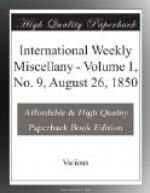The following, from Southey’s “Gridiron,” now first published in his Memoirs, ought to be set to music for the Beef-Steak Club:—
“Now the perfect Steak prepare!
Now the appointed rites begin!
Cut it from the pinguid rump.
Not too thick and not too thin;
Somewhat to the thick inclining,
Yet the thick and thin between,
That the gods, when they are dining,
May comment the golden mean.
Ne’er till now have they been blest
With a beef-steak daily drest:
Ne’er till this auspicious morn
When the Gridiron was born.”
* * * * *
The most ignorant of the world’s fools are those called “knowing ones,” a phrase satirical with the very glee of irony.
* * * * *
THE MYSTERIOUS COMPACT.
A FREE TRANSLATION FROM THE GERMAN.
PART II—CONCLUSION
(CONCLUDED FROM PAGE 192.)
Several weeks passed away. Edward spared no pains to discover some trace of the lady in question, but all in vain. No one in the neighborhood knew the family; and he had already determined, as soon as the spring began, to ask for leave of absence, and to travel through the country where Ferdinand had formed his unfortunate attachment, when a circumstance occurred which coincided strangely with his wishes. His commanding-officer gave him a commission to purchase some horses, which, to his great consolation, led him exactly into that part of the country where Ferdinand had been quartered. It was a market-town of some importance. He was to remain there some time, which suited his plans exactly; and he made use of every leisure hour to cultivate the acquaintance of the officers, to inquire into Ferdinand’s connections and acquaintance, to trace the mysterious name if possible, and thus fulfill a sacred duty. For to him it appeared a sacred duty to execute the commission of his departed friend—to get possession of the ring, and to be the means, as he hoped, of giving rest to the troubled spirit of Ferdinand.
Already, on the evening of the second day, he was sitting in the coffee-room with burghers of the place and officers of different regiments.
A newly-arrived cornet was inquiring whether the neighborhood were a pleasant one, of an infantry officer, one of Hallberg’s corps. “For,” said he, “I come from charming quarters.”
“There is not much to boast of,” replied the captain. “There is no good fellowship, no harmony among the people.”
“I will tell you why that is,” cried an animated lieutenant; “that is because there is no house as a point of reunion, where one is sure to find and make acquaintances, and to be amused, and where each individual ascertains his own merits by the effect they produce on society at large.”
“Yes, we have had nothing of that kind since the Varniers left us,” said the captain.




